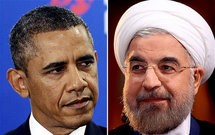 Despite a good deal of skepticism, there are a number of reasons for taking this iteration of the U.S.-Iranian negotiation seriously. The foundation for this negotiation was laid more than a decade ago, when the United States made the decision to topple Saddam Hussein, the most formidable Sunni adversary on Iran's doorstep.
Despite a good deal of skepticism, there are a number of reasons for taking this iteration of the U.S.-Iranian negotiation seriously. The foundation for this negotiation was laid more than a decade ago, when the United States made the decision to topple Saddam Hussein, the most formidable Sunni adversary on Iran's doorstep.
The United States and Iran shared (and still share) an interest in battling Sunni jihadists, a mutual distrust toward Russia and an economic incentive to maintain a stable crude supply. Washington was willing to absorb the risk of Iran re-establishing a foothold in Mesopotamia if that meant there was also a decent chance of the United States re-establishing a strategic relationship with Tehran in the Persian Gulf.
But the negotiation did not come quickly or easily. Iran, in a strengthened position, had to see just how far it could extend its sphere of influence, from Afghanistan to the Levant, before settling with Washington. In the end, Iran overextended its reach and found itself on the defensive in Syria as it was experiencing real economic pain from sanctions that had cut its oil revenues in half.
The nuclear program, as Stratfor has maintained over the past decade, would ultimately be used as a bargaining chip in this negotiation. With the election of Hasan Rouhani as president, Iran developed the internal political coherence to proceed with a negotiation at the same time that U.S. President Barack Obama was settling into his second term with an eye on Tehran for his foreign policy legacy.
Even though these negotiations still face a number of constraints, we believe they have the potential to lead to a comprehensive settlement between Iran and the United States. Leaders in the region also appear to be taking it seriously. Politicians, religious figures, militant groups and businessmen are reacting and, in some cases, adapting to what may be an inevitable U.S.-Iranian rapprochement.
Turkey, for example, has been making a concerted effort to organize state visits with Iraqi Shiite and Iranian officials, stressing that Ankara is not interested in antagonistic relationships with either Baghdad or Tehran. In practice, this means Turkey is unlikely to push hard on projects that it has pursued in defiance of Baghdad, such as an independent export pipeline for Iraq's Kurdish region, while it seeks out a compromise with its neighbors.
There are also subtle signs that the United States and Iran may be negotiating by extension in Iraq and Lebanon. While pressing Washington for more military assistance, Iraqi Prime Minister Nouri al-Maliki is moving forward in negotiations with Iraq's Sunni community to integrate more Sunnis into the political, economic and security mainstream -- a key demand of the United States that has long been resisted by the al-Maliki government. Al-Maliki recently agreed to the reactivation of Sunni Awakening forces (Sunni security forces who played an integral role in fighting al Qaeda) and will be paying a visit to Anbar province in the near future to boost security and intelligence cooperation with the Sunni-majority province.
Lebanon has also seen recent hints of collaboration among unlikely forces in this negotiating atmosphere. Kuwaiti newspaper Al-Anba created a buzz Nov. 4 when it reported that the U.S. Embassy in London was quietly engaging in direct talks with Hezbollah over the group's inclusion in a new Lebanese Cabinet. The report cited a lawmaker from the March 14 coalition (a political bloc in Lebanon that has directly competed with the Hezbollah-led March 8 coalition) as saying that U.S. Ambassador to Lebanon David Hale had communicated to Lebanese leaders that the Cabinet must include Hezbollah, marking a shift from Washington's usual rejection of Hezbollah's political activities in Lebanon.
The U.S. Embassy denied the report of direct talks, but we have received indications that the Shiite Amal Movement in Lebanon is mediating between U.S. officials and Hezbollah. Such talks, however preliminary, would be expected if the United States were looking to settle its differences with Iran on a number of issues, including Hezbollah.
More clues can be found by following the actions of Lebanese Druze leader Walid Jumblatt, an iconic figure in Lebanese politics who is known to choose his alliances based on the geopolitical realities of the day. With the United States and Iran negotiating with both the Syrian and Iranian regimes, Jumblatt is now predictably moving away from his vociferous anti-Iranian/Syrian/Hezbollah stance to a more moderate one.
He recently alienated his former allies in the Saudi-backed March 14 alliance by showing a willingness to work with the March 8 alliance on forming the Cabinet. Rumors are meanwhile swirling that Jumblatt is re-engaging with the al Assad regime through Druze mediators in Syria.
The players sitting between Tehran and Washington will have a better sense than most of which direction the geopolitical winds are blowing in the region. The hints trickling out of places like Iraq, Turkey and Lebanon, as well as the much more visible angst emanating from Israel and Saudi Arabia, all point to various players in the region taking this negotiation seriously. Some will take longer to adapt, but these are the places to watch in trying to evaluate the potential for a U.S.-Iranian settlement.
Courtesy : Stratfor (www.stratfor.com)